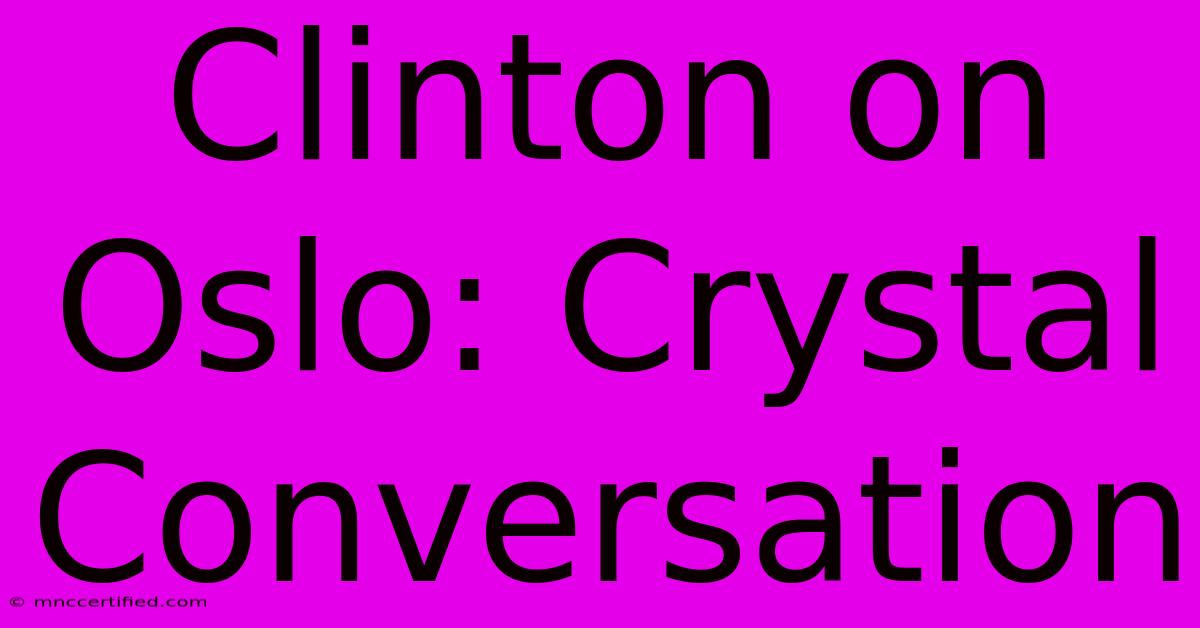Clinton On Oslo: Crystal Conversation

Table of Contents
Clinton on Oslo: A Crystal Conversation – Reassessing a Pivotal Moment in Peace Negotiations
The Oslo Accords, signed in 1993, stand as a pivotal moment in the Israeli-Palestinian conflict. While ultimately falling short of achieving lasting peace, the negotiations, brokered largely by then-US President Bill Clinton, remain a subject of intense analysis and debate. This article delves into Clinton's role in the Oslo process, examining his strategies, the challenges he faced, and the lasting legacy of his involvement. We'll explore the "crystal conversation" metaphor – referencing the fragile nature of the peace process – and analyze its relevance today.
Clinton's Active Role: More Than Just a Mediator
President Clinton's involvement in the Oslo Accords went beyond mere mediation. He actively engaged with both Israeli Prime Minister Yitzhak Rabin and PLO Chairman Yasser Arafat, employing a strategy of personal diplomacy and persistent pressure. His administration provided crucial logistical support and, critically, offered the United States' unwavering backing to both sides, hoping to bolster confidence and encourage compromises. Understanding Clinton's commitment requires understanding the geopolitical context of the time: the end of the Cold War and a growing desire for a resolution to a decades-long conflict.
The Challenges of the Peace Process: A Tightrope Walk
The Oslo Accords negotiations were fraught with challenges. Deep-seated mistrust between Israelis and Palestinians, coupled with internal divisions within both camps, created a volatile atmosphere. Security concerns for Israel were paramount, constantly threatening to derail progress. Similarly, Palestinian aspirations for statehood faced significant obstacles. Clinton had to navigate these conflicting priorities, constantly mediating between opposing viewpoints and attempting to build bridges. The assassination of Rabin in 1995, a tragic event that dramatically altered the political landscape, highlighted the fragility of the peace process.
The "Crystal Conversation" Metaphor: Fragility and Hope
The metaphor of a "crystal conversation" aptly describes the delicate nature of the Oslo negotiations. The discussions were inherently fragile, requiring careful handling and a constant awareness of the potential for breakdown. Each word, each concession, carried immense weight, capable of either fostering progress or shattering the fragile hopes for peace. Clinton, through his persistence and willingness to engage in difficult conversations, attempted to nurture this delicate dialogue, recognizing the inherent risks and rewards.
Lasting Legacy and Unfinished Business: Lessons Learned
Despite its ultimate failure to achieve lasting peace, the Oslo Accords represent a significant historical event. The accords laid the groundwork for future negotiations and created a framework, however flawed, for addressing the core issues of the conflict. Clinton's role serves as a case study in high-stakes diplomacy, highlighting the complexities and challenges of brokering peace between deeply entrenched adversaries. The lessons learned from Oslo – the importance of trust-building, addressing security concerns, and the need for internal consensus – remain crucial in any future attempts to resolve the Israeli-Palestinian conflict.
Beyond Oslo: The Continuing Relevance of Clinton's Approach
Clinton's approach, characterized by active engagement, personal diplomacy, and a willingness to take risks, provides valuable insights for contemporary peacemaking efforts. The emphasis on building relationships, understanding the nuances of each side's perspective, and fostering a climate of trust remain essential for successful conflict resolution. While the "crystal conversation" metaphor highlights the fragility of peace negotiations, it also emphasizes the crucial role of leadership, determination, and a commitment to dialogue.
Keywords: Oslo Accords, Bill Clinton, Israeli-Palestinian conflict, peace negotiations, Yitzhak Rabin, Yasser Arafat, Middle East peace process, diplomacy, conflict resolution, security concerns, political negotiation, personal diplomacy, fragile peace, crystal conversation, legacy of Oslo.
SEO Strategies:
- On-page: Keyword optimization throughout the text, use of headers for structure, meta description reflecting the article's content.
- Off-page: Promotion on social media, outreach to relevant websites and blogs, link building to authoritative sources on the subject. Consider guest posting on relevant platforms.
This article aims to provide comprehensive information while strategically utilizing keywords for improved search engine optimization. Remember to tailor your own articles to specific search terms and audiences for optimal results.

Thank you for visiting our website wich cover about Clinton On Oslo: Crystal Conversation. We hope the information provided has been useful to you. Feel free to contact us if you have any questions or need further assistance. See you next time and dont miss to bookmark.
Featured Posts
-
Court Recounts Rileys Final Hours
Nov 21, 2024
-
Iceland Volcano Eruption Flights And Travel Advice
Nov 21, 2024
-
Lainey Wilson Fulfills Young Fans Dream
Nov 21, 2024
-
George Straits Cma Tribute
Nov 21, 2024
-
Strait Honors Wife At Cma Awards
Nov 21, 2024